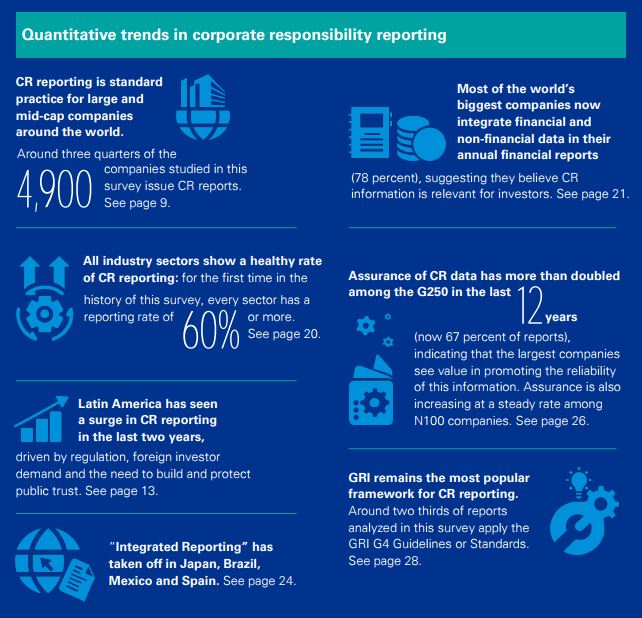
Almost three quarters (72 percent) of large and mid-cap companies worldwide do not acknowledge the financial risks of climate change in their annual financial reports, according to the KPMG Survey of Corporate Responsibility Reporting 2017 published today.
Of the minority that do acknowledge climate-related risk, less than one in 20 (4 percent) provides investors with analysis of the potential business value at risk.
KPMG’s survey studied annual financial reports and corporate responsibility reports from the top 100 companies by revenue in each of 49 countries: a total of 4,900 companies.
It found only five countries in the world where a majority of the top 100 companies mention climate-related financial risks in their financial reports: Taiwan (88 percent), France (76 percent), South Africa (61 percent), US (53 percent) and Canada (52 percent). In most cases, disclosure of climate-related risk is either mandated or encouraged in these countries by the government, stock exchange or financial regulator.
In terms of industries, companies in the Forestry & Paper (44 percent), Chemicals (43 percent), Mining (40 percent) and Oil & Gas sectors (39 percent) have the highest rates of acknowledging climate-related risk in their reporting. They are closely followed by the Automotive (38 percent) and Utilities (38 percent) sectors. Healthcare (14 percent), Transport & Leisure (20 percent) and Retail (23 percent) are the sectors least likely to acknowledge climate risk.
When looking specifically at the world’s 250 largest companies (G250), public acknowledgment of climate-related financial risk is more common but still far from universal. French-based multi-nationals lead with 90 percent acknowledging climate-related risk, followed by majors headquartered in Germany (61 percent) and the UK (60 percent).
Around two thirds of G250 companies in the Retail (67 percent) and Oil & Gas (65 percent) industries acknowledge the risk but only around one third (36 percent) of major Financial Services firms do so. However, the research found only six G250 companies that have informed investors of the potential financial impact of climate risk through quantification or scenario modelling.
KPMG’s Global Head of Sustainability Services, José Luis Blasco, said:
“Our survey shows that, even among the world’s largest companies, very few are providing investors with adequate indications of value at risk from climate change. Our findings support the need for initiatives like the Financial Stability Board’s Task Force on Climate-related Financial Disclosures (TCFD) that aim to improve corporate disclosure of climate-related risk.
“Pressure on firms to up their game on disclosure is growing by the day. Some investors are already taking a hard line approach to demanding disclosure; some countries are considering regulation to mandate it; and some financial regulators have warned that failure to identify and manage climate risk is a breach of a Board’s fiduciary duty. In this context, we encourage firms to move quickly. Those that don’t could very soon start to lose investors and find the cost of capital and insurance cover escalates quickly.”
KPMG’s survey also explored further trends in corporate responsibility reporting including reporting on the UN’s Sustainable Development Goals (SDGs), reporting on human rights and reporting on carbon reduction targets.
Key findings include:
- The UN SDGs – a set of 17 global goals to end poverty, protect the planet, and ensure prosperity for all – have resonated strongly with businesses worldwide in less than 2 years since their launch at the end of 2015. More than one third (39 percent) of the 4,900 reports studied in KPMG’s survey connect companies’ corporate responsibility activities to the SDGs. That proportion rises to over 40 percent (43 percent of reports) when looking specifically at the world’s 250 largest companies (G250).
- Around three quarters of company reports (73 percent) across the 49 countries recognize human rights as a corporate responsibility issue the company needs to address. This rises to nine out of 10 reports (90 percent) in the G250 group of companies. Companies based in India, the UK and Japan are the most likely to acknowledge the issue of human rights, as are companies in the Mining sector.
- Two thirds of reports (67 percent) from the world’s 250 largest companies disclose targets to reduce the company’s carbon emissions. However, the majority of these reports (69 percent) do not align the company’s targets to the climate targets being set by governments, regional authorities (such as the EU) or the UN.
José Luis Blasco said:
“It is not only employees, communities and NGOs who take an interest in corporate responsibility and sustainability issues. Investors are also increasingly aware that topics previously considered “non-financial” can have a material impact on a business’s ability to build and protect value both in the short-term and the long-term. Companies therefore need to understand the latest trends in reporting and ensure their own reports meet the expectations of a wide range of stakeholders.”
Download the KPMG Survey of Corporate Responsibility Reporting 2017 (pdf)




